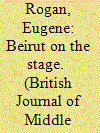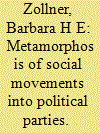|
|
|
Sort Order |
|
|
|
Items / Page
|
|
|
|
|
|
|
| Srl | Item |
| 1 |
ID:
181102


|
|
|
|
|
| Summary/Abstract |
In the immediate aftermath of the First World War, two nationalist theatre companies in Beirut staged a new play in 1919 encapsulating the civilian hardships of four years of the war. While little is known of the author, George Murad, details from the preface and dedication to the printed edition would situate him among pro-French Maronite Christians seeking independence for a greater Lebanon under French protection. The play, “Beirut on the Stage,” would appear to have been an example of political theatre seeking to validate the wartime suffering of Lebanese Christians through a vision of independence that, by the time the play was published in 1920, had already been undermined by French measures to colonise, rather the liberate, Greater Lebanon.
|
|
|
|
|
|
|
|
|
|
|
|
|
|
|
|
| 2 |
ID:
181108


|
|
|
|
|
| Summary/Abstract |
The ‘Jasmine Revolution’ that toppled Tunisian president Zine al-‘Abidine Ben ‘Ali on 14 January 2011, and the 25 January 2011 uprising that toppled Egyptian President Husni Mubarak had similar characteristics yet different outcomes. While the Tunisian experience led to democratization and to a non-violent transfer of power, the Egyptian one led to a reversion to authoritarianism through a military coup and to bloodshed. This paper suggests that the key to understanding the diverse outcomes of the Arab Spring in these countries is the prevalence of consensus/dissensus in each society over the most suitable state model for the post-revolutionary era. The existence of an agreed-upon vision for the post-Arab Spring state in Tunisia—a vision of a ‘civil state’—and a wide controversy over such a model in Egypt was a pivotal factor influencing the level of socio-political cohesion during the transitional period, hence determining whether it is destined for success or failure. A prior agreement between Islamist and Secularist opposition groups over the civil state model spared Tunisia the turmoil that Egypt went through due to the polarization over the desired state model in the post-Mubarak era, which served as a catalyst for the 2013 soft coup against the Muslim Brothers elected president.
|
|
|
|
|
|
|
|
|
|
|
|
|
|
|
|
| 3 |
ID:
181110


|
|
|
|
|
| Summary/Abstract |
Since the early 2010s, the global migrant crisis has led to the mass inflow of foreign migrants, refugees, and other displaced persons into numerous countries. Whereas some native citizens have welcomed these migrants, a large number have expressed opposition. Most theories explaining why citizens express opposition to migrants emerged from evidence collected in developed, European countries. Yet, developing, non-Western countries especially in the Middle East and North Africa (MENA) have borne the brunt of today’s migrant crisis. This study uses an original survey of 1500 citizens conducted in Morocco’s Casablanca-Settat region to explore how effectively traditional theories explain opposition to migrants amongst citizens of the MENA. Like those in many North African countries, Morocco’s migrants hail mostly from Arab countries (e.g. Syria, Iraq) or sub-Saharan African countries (e.g. Nigeria, Congo). We find the expected citizen opposition to migrants, but also that this opposition is more intense with respect to migrants from sub-Saharan Africa. While recent studies of Europe emphasize how cultural differences drive opposition to migrants, our results indicate that material issues—concerns about migrants’ negative effects on the economy and internal security—tend to motivate such attitudes in Morocco. Concerns about cultural conflicts and other immaterial differences play a smaller, secondary role.
|
|
|
|
|
|
|
|
|
|
|
|
|
|
|
|
| 4 |
ID:
181105


|
|
|
|
|
| Summary/Abstract |
The holy book for Muslims is the ‘Quran.’ The Quran is written in Arabic and due to its nature, is accepted as sacred, its divine revelation—it’s being the word of God. The Quran, after its revelation has been translated into many languages. Whether Muslim or not, people who do not know the Arabic language are unable to read the Holy Quran, the source text in its original language, but somehow this needs to be communicated. As a result, the demand for religious or Quranic exigencies occurred and this was met through various discourse types such as interpretations, translations or translations of meaning. The present study attempts to investigate, how interactive and interactional metadiscourse markers were employed in the Surah Yaseen, in three different English translations of the Quran. These Quran translations belong to Muhammad Marmaduke Pickthall, Abdullah Yusuf Ali and IFTA, and Talal Itani. As can be seen from the present study, metadiscourse markers employed by these translators of the Quran, have presented the Quran readers with a sense of the translator’s own identity and selected mode of interaction.
|
|
|
|
|
|
|
|
|
|
|
|
|
|
|
|
| 5 |
ID:
181104


|
|
|
|
|
| Summary/Abstract |
‘Authority to use force’ has been a subject of contentious debate, not least among the academics, politicians and lawyers, since the oft-occurrence of use of armed forces by non-state actors and terrorist groups in modern world. Since 9/11 terrorist attacks, most use of force by non-state actors and terrorist groups, which occurred primarily in Muslim majority states, have been categorized as acts of terrorism. This categorization has been made without any rational or sound scrutiny of such use of force and accordingly resulted in controversies. This article is a historical, legal and political account of Islamic international law on the use of force. It defines and interprets the fundamental principles of use of force in Islamic international law, such as jihad, and analyses the significance of those principles in scrutinizing legal and political authority to use force at the state level and inter-state level.
|
|
|
|
|
|
|
|
|
|
|
|
|
|
|
|
| 6 |
ID:
181107


|
|
|
|
|
| Summary/Abstract |
The historiography of Ottoman-Qajar frontiers emphasizes the European creation and promulgation of border control and ethnonationalism. This article considers the way that border dwellers in the Iran-Iraq frontier greeted border enforcement, nationalism, and racial politics. Despite the zeal with which local elites accepted these European ideas, the Arabs of southwestern Iran paid little attention to the policies emanating from Tehran. Europeans, in fact, noted their disinterest and argued that the concept of nationalism, borders, and race did not carry potency in Arabistan, Iran’s southwestern frontier. Although historians emphasize the birth of nation-states and the decline of empires in the Middle East at turn of the twentieth century, this article considers the ambivalence with which communities in an oil-rich frontier greeted the new ideological constructions of race and borders.
|
|
|
|
|
|
|
|
|
|
|
|
|
|
|
|
| 7 |
ID:
181103


|
|
|
|
|
| Summary/Abstract |
The article studies newly established parties with roots in social movements. Using the post-Spring development of Egyptian Muslim Brotherhood and Tunisian al-Nahda as in-depth empirical cases, the study reflects on prevalent theoretical explanations for the transitions of social movements into political parties. The paper argues that extant literature on party system institutionalization and the development of social movement organizations do not adequately explain the driving factors for the transition process of movements into parties. A focus on party systems does not take note of the dynamics of movement-party relations, while social movement theory remains steeped in conceptions of institutional evolution and ‘natural progression’ in politics. When rethinking party institutionalization, it needs to be recognized that it is a precarious process during which features of social movement activism overlap with the formalized engagement that characterizes political parties. The comparative study of the Muslim Brotherhood-led Freedom and Justice Party and the Tunisian al-Nahda Movement and its al-Nahda Party exemplifies that the degree to which leading parties emancipate themselves from the guardianship of their ‘mother-organizations’ is an essential factor for democratic state-building.
|
|
|
|
|
|
|
|
|
|
|
|
|
|
|
|
| 8 |
ID:
181106


|
|
|
|
|
| Summary/Abstract |
Well-being through outdoor life and ecolacy are fundamental concepts in sociological research with regard to the question whether nature is instrumental for integration into some Western societies. In this article, we ask if the Saudi Arabian protagonist in Muḥammad Ḥasan ʿAlwān’s novel, al-Qundus, (The Beaver), 2011, becomes a part of, ‘integrated in’, North American society by means of ecolacy. An ecocritical and sociological reading, which takes into account human and non-human communication, shows that the protagonist does not become integrated into the North American society to which he has immigrated by way of his acquired ecolacy. Rather, his steps towards ecolacy seem to lead to self-knowledge and reconciliation with his family members in Riyadh rather than being a conduit to integration.
|
|
|
|
|
|
|
|
|
|
|
|
|
|
|
|
| 9 |
ID:
181111


|
|
|
|
|
| Summary/Abstract |
Elections within authoritarian contexts and social movements have been thoroughly, yet separately, studied. This article jointly analyzes these different phenomena in order to demonstrate how electoral results can affect protest demobilization. My interviews with the February 20 Movement (F20), the main organizer of mass protests in Morocco during the Arab Spring, reveals how the parliamentary victory of an opposition Islamist party, the Justice and Development Party (PJD), helped lead to the F20’s eventual halt of protests. During my fieldwork, I conducted 46 semi-structured elite interviews with civil society activists, political party leaders, MPs, and independent activists throughout Morocco. This article argues that the 2011 victory of an opposition Islamist party, which had not previously been allowed to win a plurality of parliamentary seats, played a major role in quelling protests. The ushering of Islamists into power following the Arab Spring is often viewed as a threat to the state. In Morocco, however, the winning of the PJD in parliamentary elections signaled to the public that change had occurred and convinced many Moroccans that a social movement for change was no longer needed. Said differently, the state needed Islamists to win.
|
|
|
|
|
|
|
|
|
|
|
|
|
|
|
|
| 10 |
ID:
181109


|
|
|
|
|
| Summary/Abstract |
Alevis of Turkey and Alawites of Syria have different origins, traditions and political experience. After the outbreak of the civil war in Syria, Turkish government took a clear stand by supporting the Sunni rebels fighting the Syrian state forces. This enthusiastic support for the Sunni segments was accompanied with condemnations against Syrian Alawites and discrimination against the Alawite refugees. The civil war in Syria and the Turkish government’s response to it brought Alevis of Turkey and Alawites of Syria closer and created a solidarity based on close religious beliefs. Alevi community in Turkey provided assistance to the Alawite refugees from Syria and Alevi leaders started to create a narrative focusing on identity similarities between and common threats against the Alevis and Alawite communities. Using interviews and public statements, this article shows how the securitization of identities and discrimination can result in new units of advocacy and belonging.
|
|
|
|
|
|
|
|
|
|
|
|
|
|
|
|
|
|
|
|
|